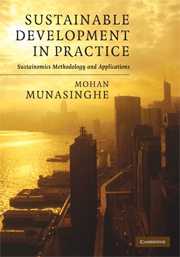Book contents
Foreword by James Gustave Speth
Published online by Cambridge University Press: 05 August 2012
Summary
Sustainable development is the foremost challenge to humanity in the twenty-first century. It affects every human being on the planet, and therefore we are all stakeholders. Traditional development has focused on material-based economic growth to overcome problems such as poverty, hunger, sickness and inequality. However, despite impressive progress during the last century, especially in the OECD and middle-income countries, these issues have grown worse in most of the poorest countries, and even among poorer communities in the industrial world. New challenges, such as environmental degradation, violent conflicts, climate change and runaway globalization, could exacerbate problems and make them unmanageable.
At the global level, several thousand leading scientists in the United Nations Intergovernmental Panel on Climate Change (IPCC) have clearly confirmed that human activities that emit greenhouse gases are leading to potentially catastrophic global warming. Similarly, the recent Millennium Ecosystem Assessment, commissioned by UN Secretary General Kofi Annan and written by foremost ecologists, has chronicled the steady decline of ecosystem services, which support all life on the planet. They have urged early action to reverse this alarming trend. Yet, the alleviation of poverty among billions (who eke out their existence on less than one dollar a day) will require continued economic growth in those areas. Maintaining this balance among economic, social and environmental needs is the essence of sustainable development.
- Type
- Chapter
- Information
- Sustainable Development in PracticeSustainomics Methodology and Applications, pp. xi - xiiPublisher: Cambridge University PressPrint publication year: 2009

